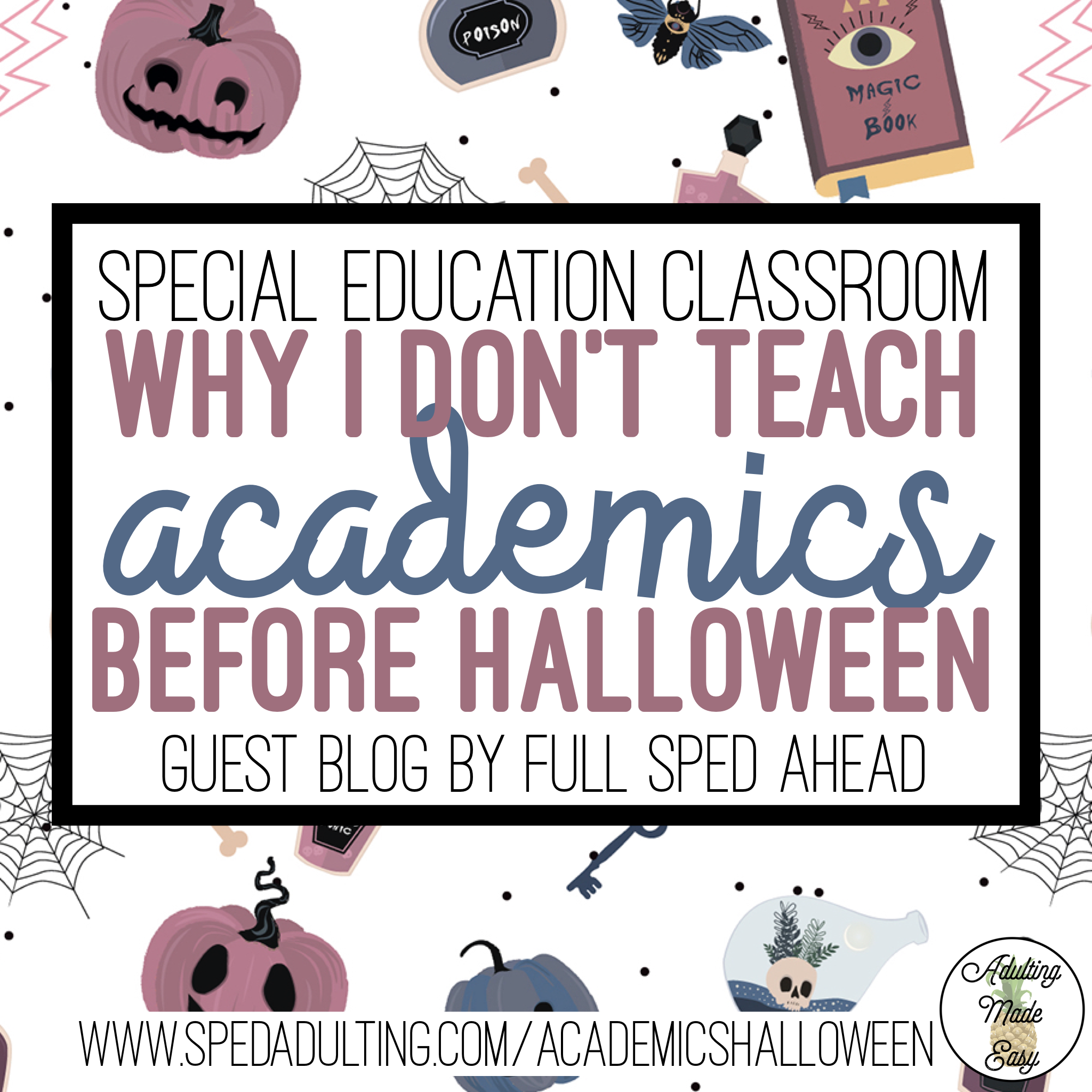No academics until Halloween? … Trust me!
Featured guest blogger: Heather, a middle school functional life skills self-contained teacher and blogger at Full Sped Ahead.
Now, I know what you’re thinking. No academics!? How dare you say that! What will I do with my students for 6-8 weeks? I promise you’ll thank me later if you try this out. Here are the areas I focus on for 6-8 weeks*:
*this time may change depending on how many new students I have and their abilities… oh and virtual learning. Also, keep in mind, everyone starts school at different times of the year (so Halloween may be longer than 8 weeks for some people) or maybe you have different requirements from admin.
Routines and Expectations
Special education students need routines. First, the students need to know what is happening during their day and in what order. Visual schedules are a simple solution to help with that. Not ready to make schedules? To solve this, use a first then visual.
In my classroom, I show my students visual pictures of the subjects that are happening first and the activity that will follow. For example, I may show a lunch image, then tell them “First Reading, then Lunch” Students start to associate Reading coming before lunchtime. Keep your schedule consistent as much as possible.
On a daily basis, continue to reinforce their schedule and tasks. After a couple of weeks, you will see your students catch on.
Some other areas to focus your attention would be how you want them to:
- Walk in the hallway
- Get their materials for class
- Put away their backpacks
- Ask to use the bathroom
- Transition when the bell rings
You need to explicitly show them each step of their day to enforce the routines. Typically, my students in previous years have taken about 6 weeks to adjust and gain the concept of these aspects of their day. Your students may learn quicker or slower than that. Use your own judgment for what works best in your room. Still no academics!
Independent Work Stations
In the next step, while teaching routines and expectations for your classroom, you should be teaching independent work. Students need to be able to learn how to occupy their own time for as long as they can. By promoting activities that your students can do on their own, you will have some free time to focus on behaviors, data collection, and eventually teaching instruction to other students.
Independent skills are important for our students. Special education students will be able to gain confidence in their abilities to do for themselves. At the beginning of the year, I get self-contained students from elementary school and they rely heavily on staff interactions and encouragement as they complete a task. I work to fade that support as they progress through the school year.
If you feel there is NO WAY that your students will work independently, think again. Start with simple tasks. Try “put in” tasks or errorless work. Teach students to pick up an item and put it into a container. Add more items as they gain the skill. Yep, still no academics!
Examples:
- Pom Poms in a plastic bottle
- Pencils in a pencil case
- Straws into a cup with a lid
Collect Baseline Data
Data drives instruction. First of all, I am a firm believer that the student’s IEP will only tell you so much detail about the student’s ability. You need to see the student and work with the student directly to get to know the student. An IEP is really only a snapshot of their abilities.
I can not tell you how many times I’ve read through an IEP from the previous case manager and find that the IEP is not up to date. This could be due to multiple different things, but typically I look and see that the IEP was written in October from the year prior. It’s now August, and I have no idea what skills that student gained from last year.
I typically have to start over to find out where the student is at. After all of these steps listed above, I collect baseline data. My aides and I go over the basic skills that a student would need to know for my program.
Using this data, I will be able to group students based on their abilities and skills. I use this to make all decisions, from what to teach and how to teach. Finally, this is my starting point for when I start teaching. However, the first couple weeks of school come with their own issues, so I typically take up to 8 weeks to truly test all my students over multiple days and give them multiple opportunities to show their skills.
You still have no academics!
Thank you for following my crazy ideas! I hope you are able to take something and apply it to your program! If you have any questions, comments or concerns, I’d love to hear from you in the comments below!
You might like this blog post:
Blog Cover Photo Clipart by: Over App – Mio Buono






